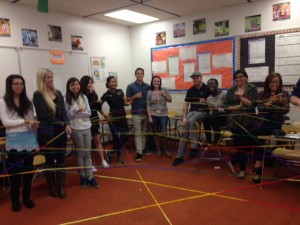So, today, a colleague of mine and I received a decision on a revised manuscript that we submitted for review. While the initial reviews were professional and constructive, the reviewers were less than pleased with our revision with one reviewer calling our revised work “quite alarming,” “self-congratulatory,” and saying that the manuscript quite possibly “detracted from the complex, messy and hard work we engage in everyday of working to sustain identities and compose lives as teacher educators” critiquing our lack of critical engagement and inquiry.
Okay, so, clearly, this was not the best work my colleague and I have ever submitted and the way in which our data was addressed could have been more critical and careful. In fact, the content of the critique allowed us to think about our work differently and we admittedly should have taken more time to resubmit our piece. However, reading the feedback and having received feedback that was similar in tone previously to an article (though substantively different), made me realize the importance of tone in feedback…
In our final class session last week, several students mentioned the importance of the feedback I provided for them over the semester as well as the importance of the safety of community in the classroom as they were learning about and establishing their professional identities. Students emphasized how essential the timely, thoughtful responses to their work were in their development and one student who I’ll call “D” said something that really stuck with me, “You know, when I submitted something and Professor Hsieh gave me feedback, I never had to be afraid that she was going to yell at me. She would just tell me what I needed to improve on and I would say, ‘Okay, I can do that’,’ and then I would know how it could be better.” I turned to him, with a bit of amusement mixed with concern and said, “D, did you really think I’d yell at you?” He said that he didn’t really think that but that sometimes other instructors had made him feel like he really didn’t know what he was doing without telling him what he needed to do differently.
In the case of our submission, there was clear feedback on what needed to be changed in the article, but the tone of the critique was condescending and problematic, exactly the paternalistic & oppressive tone that we had been accused of perpetuating in the paper itself. While I am confident enough in my own professional identity to come back from this critique and while I have done extensive inquiry into and reflection on my own work as a teacher educator to know that this feedback certainly doesn’t represent who I am as a teacher educator (I’ve never been called self-congratulatory in my life before today), the tone of this review makes me wonder how we treat our colleagues, fellow scholars, and our students in giving feedback.
Words hurt. And people’s lives, their work, their thoughts matter. Even if a piece isn’t accepted for a journal, even if a student shouldn’t be a teacher (and there are some that truly and painfully shouldn’t), there is no value in devaluing the work, the life, the passion of others. This doesn’t mean that we accept every submission or that we lower our standards for rigor in our courses, but it does mean that we recognize that what we say, particularly when we evaluate one another, has power, and we treat that power with the utmost respect and care–like we should treat the humans to whom we are responding.

